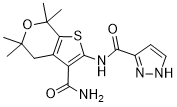Amongst others in lung cancer. Recent publications evaluated the role of anti-EGFR therapies in biliary tracts carcinomas. Chiorean and colleagues tested Erlotinib and Docetaxel in Advanced and Refractory Hepatocellular and Biliary Cancers in a Phase II Trial of the Hoosier Oncology Group GI06-101. They came to the conclusion that anti-EGFR therapy remains to be an important possibility in these tumors but only with a molecular “targeted” approach. We were able to show that a high EGFR mRNA expression level is associated to patients’ survival and confers a significantly worsened chance to survive longer than one year,  whereas patients with lower EGFR expression had a median survival time of more than 3 years. These results are in agreement with conclusions from other groups that also indicated a higher chance for better outcome in low expression groups. With receiver operating characteristic curve analysis we were able to show that the 35th percentile cut-off of the EGFR mRNA expression could be useful in identifying those patients at risk for shortened survival with a sensitivity of 80% and a specificity of 75%. As Andersen and colleagues recently published the selection of patients from high risk groups may indicate the necessity of AbMole Nitisinone modified treatment and seems to be useful also in cholangiocarcinoma. It has already been discussed by other groups that measuring genes from the angiogenesis pathway seems to be a promising approach in tumors of the biliary tract and pancreas, especially due to their hypoxic nature. In preceding works we were able to shed light on a strong association of Hif1a expression with survival in pancreatic cancer and soft tissue sarcomas. However, this association was not significant in the examined study group of patients with cholangiocarcinoma which is in concordance with discoveries from other groups examining Hif1a in CCC who were also not able to show a correlation of Hif1a expression to survival. VEGFR 2/3 expression was tested in several studies so far. There is however only limited data available for the expression of FLT1/VEGFR1 in cholangiocarcinoma though Rogler and others suggested a potential association with a more aggressive phenotype. We were able to show for the first time that FLT1 seems to be independently associated with overall survival of patients with a biliary tract tumor. Interestingly Kaplan-Meier Analysis revealed that patients with a higher FLT1 expression potentially have a better outcome, though one would anticipate high expression to indicate a more aggressive tumor. Patients with a high expression showed a median overall survival time of 23.6 months and 40% of patients surviving longer than 3 years. The independent association of high FLT1 expression with better outcome was supported by a stepwise multivariate Cox proportional hazards regression model. In this study group FLT1 was the strongest independent factor associated with overall survival. Especially due to the destructive locally invasive behavior and a high rate of distant metastasis we already tested HPSE in pancreatic cancer.
whereas patients with lower EGFR expression had a median survival time of more than 3 years. These results are in agreement with conclusions from other groups that also indicated a higher chance for better outcome in low expression groups. With receiver operating characteristic curve analysis we were able to show that the 35th percentile cut-off of the EGFR mRNA expression could be useful in identifying those patients at risk for shortened survival with a sensitivity of 80% and a specificity of 75%. As Andersen and colleagues recently published the selection of patients from high risk groups may indicate the necessity of AbMole Nitisinone modified treatment and seems to be useful also in cholangiocarcinoma. It has already been discussed by other groups that measuring genes from the angiogenesis pathway seems to be a promising approach in tumors of the biliary tract and pancreas, especially due to their hypoxic nature. In preceding works we were able to shed light on a strong association of Hif1a expression with survival in pancreatic cancer and soft tissue sarcomas. However, this association was not significant in the examined study group of patients with cholangiocarcinoma which is in concordance with discoveries from other groups examining Hif1a in CCC who were also not able to show a correlation of Hif1a expression to survival. VEGFR 2/3 expression was tested in several studies so far. There is however only limited data available for the expression of FLT1/VEGFR1 in cholangiocarcinoma though Rogler and others suggested a potential association with a more aggressive phenotype. We were able to show for the first time that FLT1 seems to be independently associated with overall survival of patients with a biliary tract tumor. Interestingly Kaplan-Meier Analysis revealed that patients with a higher FLT1 expression potentially have a better outcome, though one would anticipate high expression to indicate a more aggressive tumor. Patients with a high expression showed a median overall survival time of 23.6 months and 40% of patients surviving longer than 3 years. The independent association of high FLT1 expression with better outcome was supported by a stepwise multivariate Cox proportional hazards regression model. In this study group FLT1 was the strongest independent factor associated with overall survival. Especially due to the destructive locally invasive behavior and a high rate of distant metastasis we already tested HPSE in pancreatic cancer.